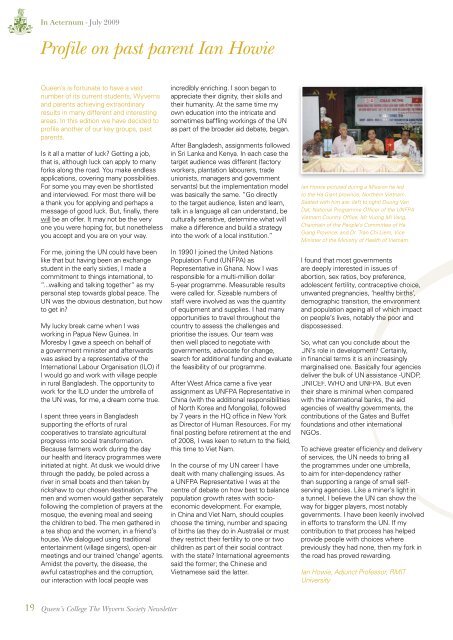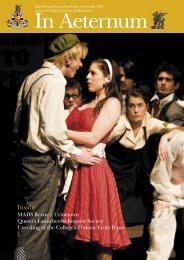In Aeternum, July 2009 Download PDF - Queen's College ...
In Aeternum, July 2009 Download PDF - Queen's College ...
In Aeternum, July 2009 Download PDF - Queen's College ...
Create successful ePaper yourself
Turn your PDF publications into a flip-book with our unique Google optimized e-Paper software.
19<br />
<strong>In</strong> <strong>Aeternum</strong> - <strong>July</strong> <strong>2009</strong><br />
Profile on past parent Ian Howie<br />
Queen’s is fortunate to have a vast<br />
number of its current students, Wyverns<br />
and parents achieving extraordinary<br />
results in many different and interesting<br />
areas. <strong>In</strong> this edition we have decided to<br />
profi le another of our key groups, past<br />
parents.<br />
Is it all a matter of luck? Getting a job,<br />
that is, although luck can apply to many<br />
forks along the road. You make endless<br />
applications, covering many possibilities.<br />
For some you may even be shortlisted<br />
and interviewed. For most there will be<br />
a thank you for applying and perhaps a<br />
message of good luck. But, fi nally, there<br />
will be an offer. It may not be the very<br />
one you were hoping for, but nonetheless<br />
you accept and you are on your way.<br />
For me, joining the UN could have been<br />
like that but having been an exchange<br />
student in the early sixties, I made a<br />
commitment to things international, to<br />
“...walking and talking together“ as my<br />
personal step towards global peace. The<br />
UN was the obvious destination, but how<br />
to get in?<br />
My lucky break came when I was<br />
working in Papua New Guinea. <strong>In</strong><br />
Moresby I gave a speech on behalf of<br />
a government minister and afterwards<br />
was asked by a representative of the<br />
<strong>In</strong>ternational Labour Organisation (ILO) if<br />
I would go and work with village people<br />
in rural Bangladesh. The opportunity to<br />
work for the ILO under the umbrella of<br />
the UN was, for me, a dream come true.<br />
I spent three years in Bangladesh<br />
supporting the efforts of rural<br />
cooperatives to translate agricultural<br />
progress into social transformation.<br />
Because farmers work during the day<br />
our health and literacy programmes were<br />
initiated at night. At dusk we would drive<br />
through the paddy, be poled across a<br />
river in small boats and then taken by<br />
rickshaw to our chosen destination. The<br />
men and women would gather separately<br />
following the completion of prayers at the<br />
mosque, the evening meal and seeing<br />
the children to bed. The men gathered in<br />
a tea shop and the women, in a friend’s<br />
house. We dialogued using traditional<br />
entertainment (village singers), open-air<br />
meetings and our trained ‘change’ agents.<br />
Amidst the poverty, the disease, the<br />
awful catastrophes and the corruption,<br />
our interaction with local people was<br />
Queen’s <strong>College</strong> The Wyvern Society Newsletter<br />
incredibly enriching. I soon began to<br />
appreciate their dignity, their skills and<br />
their humanity. At the same time my<br />
own education into the intricate and<br />
sometimes baffl ing workings of the UN<br />
as part of the broader aid debate, began.<br />
After Bangladesh, assignments followed<br />
in Sri Lanka and Kenya. <strong>In</strong> each case the<br />
target audience was different (factory<br />
workers, plantation labourers, trade<br />
unionists, managers and government<br />
servants) but the implementation model<br />
was basically the same. “Go directly<br />
to the target audience, listen and learn,<br />
talk in a language all can understand, be<br />
culturally sensitive, determine what will<br />
make a difference and build a strategy<br />
into the work of a local institution.”<br />
<strong>In</strong> 1990 I joined the United Nations<br />
Population Fund (UNFPA) as<br />
Representative in Ghana. Now I was<br />
responsible for a multi-million dollar<br />
5-year programme. Measurable results<br />
were called for. Sizeable numbers of<br />
staff were involved as was the quantity<br />
of equipment and supplies. I had many<br />
opportunities to travel throughout the<br />
country to assess the challenges and<br />
prioritise the issues. Our team was<br />
then well placed to negotiate with<br />
governments, advocate for change,<br />
search for additional funding and evaluate<br />
the feasibility of our programme.<br />
After West Africa came a fi ve year<br />
assignment as UNFPA Representative in<br />
China (with the additional responsibilities<br />
of North Korea and Mongolia), followed<br />
by 7 years in the HQ offi ce in New York<br />
as Director of Human Resources. For my<br />
fi nal posting before retirement at the end<br />
of 2008, I was keen to return to the fi eld,<br />
this time to Viet Nam.<br />
<strong>In</strong> the course of my UN career I have<br />
dealt with many challenging issues. As<br />
a UNFPA Representative I was at the<br />
centre of debate on how best to balance<br />
population growth rates with socioeconomic<br />
development. For example,<br />
in China and Viet Nam, should couples<br />
choose the timing, number and spacing<br />
of births (as they do in Australia) or must<br />
they restrict their fertility to one or two<br />
children as part of their social contract<br />
with the state? <strong>In</strong>ternational agreements<br />
said the former; the Chinese and<br />
Vietnamese said the latter.<br />
Ian Howie pictured during a Mission he led<br />
to the Ha Giant province, Northern Vietnam.<br />
Seated with him are: (left to right) Duong Van<br />
Dat, National Programme Officer of the UNFPA<br />
Vietnam Country Office, Mr Vuong Mi Vang,<br />
Chairmain of the People’s Committee of Ha<br />
Giang Province; and Dr. Tran Chi Liem, Vice<br />
Minister of the Ministry of Health of Vietnam.<br />
I found that most governments<br />
are deeply interested in issues of<br />
abortion, sex ratios, boy preference,<br />
adolescent fertility, contraceptive choic oice,<br />
unwanted pregnancies, ‘healthy births’,<br />
demographic transition, the environment vironme<br />
and population ageing all of which iimpact<br />
on people’s lives, notably the he poor poo and<br />
dispossessed.<br />
So, what can you conclude ude about the<br />
UN’s role in development? ent? Certainly,<br />
in fi nancial terms it is an increasingly<br />
i<br />
marginalised one. Basically ica four agencies<br />
deliver the bulk of UN as assistance -UNDP,<br />
UNICEF, WHO and UNFPA. N But even<br />
their share is minimal wwhen<br />
compared<br />
with the international banks, ba the aid<br />
agencies of wealthy governments, ov the<br />
contributions of the Gates te and Buffet<br />
foundations and other international<br />
nte<br />
NGOs.<br />
To achieve greater effi ciency cy and delivery<br />
of services, the UN needs to o bring b all<br />
the programmes under one umbrella, umb<br />
to aim for inter-dependency rather ther<br />
than supporting a range of small selfserving<br />
agencies. Like a miner’s light ht in<br />
a tunnel, I believe the UN can show the<br />
way for bigger players, most notably<br />
governments. I have been keenly involved<br />
in efforts to transform the UN. If my<br />
contribution to that process has helped<br />
provide people with choices where<br />
previously they had none, then my fork in<br />
the road has proved rewarding.<br />
Ian Howie, Adjunct Professor, RMIT<br />
University



